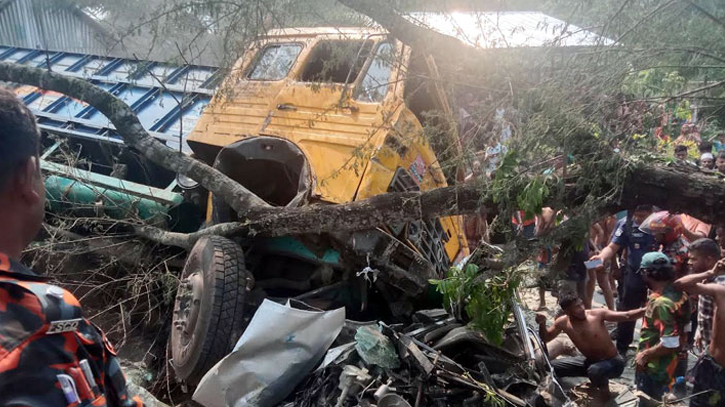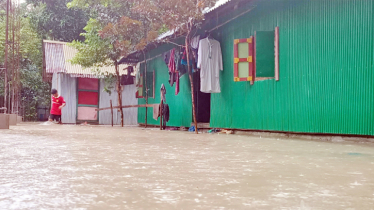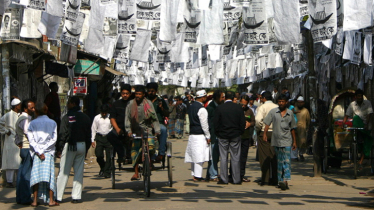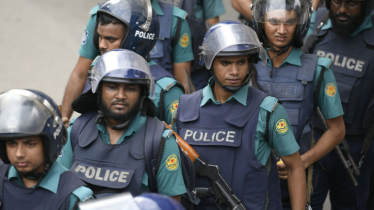
Photo : Collected
The celebration of Eid has been overshadowed by sorrow. Upon opening the newspaper, one is met with tragic news of road accidents. Over the past few days, the death toll from accidents has surged. How long will our roads remain tainted with blood?
Tragically, approximately 28 lives were lost in road and waterway accidents nationwide before and after Eid, as reported by BIWTA, fire service, and highway police. Additionally, from April 9 to 15, over two hundred road accidents were recorded across the country. Among these incidents, on Tuesday, 14 individuals, including 6 members of the same family, perished in a collision involving a bus and a pickup at Kanaipur in Faridpur. At least 12 people were killed and several others injured after a truck ploughed through several vehicles in Gabkhan Bridge area of Jhalakathi's Sadar upazila on Wednesday afternoon.
The alarming frequency of road accidents continues to claim lives unabated. During Eid and throughout the year, countless lives are lost to these tragic events, yet solutions remain elusive. The root causes of these accidents are well-documented: faulty vehicles, disregard for traffic regulations, distracted driving such as mobile phone use, overloading of passengers and cargo, reckless driving behaviors, inadequate railway management, and the alarming prevalence of drug use among drivers. Substance abuse leads drivers to operate vehicles while impaired, resulting in loss of control and devastating collisions.
Moreover, roads witness an unsettling atmosphere of competition among motorists, where larger vehicles often assert dominance over smaller ones, leading to collisions. Despite proposed legislation advocating for harsh penalties, including imprisonment up to 10 years for fatalities caused by reckless driving, compliance with traffic laws remains lacking. Additionally, accidents frequently occur due to the negligence and lack of education among drivers.
Every loss of life is a profound tragedy, particularly when it occurs unexpectedly and prematurely in a tragic accident. The aftermath of such incidents is marked by chaos and anguish, underscoring the urgent need for collective action to address this alarming trend. The continuation of these preventable accidents is simply untenable. The precious flame of human life should never be snuffed out prematurely in this manner. With the causes of these accidents well-known, implementing effective preventive measures should not be a challenge.
Moazzem Hossain, the director of Bangladesh University of Engineering and Technology's Accident Research Institute, stated that simply changing laws or increasing awareness will not improve the traffic system. He emphasised that the primary issue on the roads of Dhaka city is mismanagement.
The safety of our country's roads is compromised due to various reasons. One significant factor is the lack of effective implementation of laws and regulations governing road transport. Despite having laws in place, their enforcement remains weak, often influenced by transport leaders who hold influential positions within the government. This situation hampers the effective implementation of road safety measures, leading to the continued occurrence of accidents and loss of lives on the roads.
Experts emphasise that the development of the road transport system requires a well-coordinated management of public transport within the city according to a comprehensive plan. This responsibility should be shared among transport authorities, traffic police, and the city corporation to effectively address and prevent accidents on the roads.
In addition to enforcing laws effectively and implementing necessary changes to prevent road accidents, ongoing awareness and training programs for drivers are crucial. However, ensuring road safety requires awareness not only among drivers but also among passengers and pedestrians. Modernising traffic laws is essential to address road accidents comprehensively. Traffic police must demonstrate dedication in fulfilling their duties and responsibilities. The operation of unfit vehicles on roads must be halted, and measures should be taken to prevent individuals with fake licenses from driving. Awareness campaigns should emphasise adherence to traffic laws and discourage reckless driving. Strict enforcement of laws is necessary to control accidents, and police administrations should conduct regular operations on roads. Violators should face penalties to deter unsafe practices.
Messenger/Fameema








